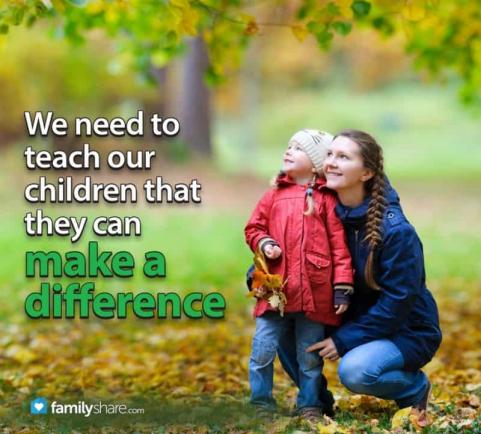
Adults worldwide are starting to realize the negative effects of neglecting our environment. While the media is quick to report conflicting stories about the state of the environment, many families are deciding to stand up for the planet simply because it's the right thing to do. As you start to increase your family's eco-awareness, here are some topics to focus on.
Waste not, want not
We live in a wasteful society. Many of us have been conditioned to throw things away without thought, and pollution is rampant. In fact, the average American produces an average of four pounds of garbage a day. We can teach our children to reduce their environmental impact by encouraging them to reuse everyday objects. We can also help our children learn to be charitable as we encourage them to donate unwanted objects to charitable organizations. Discuss the benefits of buying used or re-purposing old items as a way to conserve resources. Teach your children to be happy without every new thing they see. The best way to become more eco-friendly is to reduce consumerism.
Family recycling
Even the youngest of children can learn to recycle. Set up a recycling station in your home, and teach the entire family how to sort recyclable goods into the appropriate containers. Take time to explain what happens to recycled goods, and point out products that have been made from recycled goods in the store or your home. Emphasize that, as we all recycle together, we can have a big impact on the amount of trash that ends up in landfills. Make it clear that when we fail to recycle, we contribute to pollution.
Get to know your food chain
In industrialized countries, many children are very removed from their food chains. Show your children where and how food is produced by touring a local farm. Children will learn the importance of sustainable farming and organic farming as they see these principles in action. Shop with your children at a farmer's market or local food co-op, and explain the pathway food takes to get from a grower to the table. Purchase minimally processed food for your family, and try to purchase food from local sources. To really get the whole family involved, plant a vegetable garden to teach your family about composting, planting, growing, and preserving fresh food.
Spend some time in nature
Children will conserve what they love and children will love nature if they spend time there. Take a family camping trip or go for a hike together. These outdoor adventures will expose your children to the beauty of nature and drive home the core value of conservation. Teach your children to leave no trace when they spend time in the wilderness and encourage them to properly care for their camp or picnic site. Discuss water conservation as you play in a mountain lake or stream and talk about ways you can protect the habitat of the wildlife you see as you hike. These family outings will become cherished memories.
Conserving resources and respecting the earth ensures that our children will enjoy a healthy planet, have decreased world conflict, and have healthier bodies thanks to reduced exposure to chemicals. If we want the environmental gains of recent years to pass down to the next generation, we need to start teaching our children today to care about their planet. We need to teach our children to care and they need to believe that they can make a difference. The greatest danger to environmentalism today is apathy. We can combat this lack of caring by conscientiously teaching our children to care for the planet we share.

